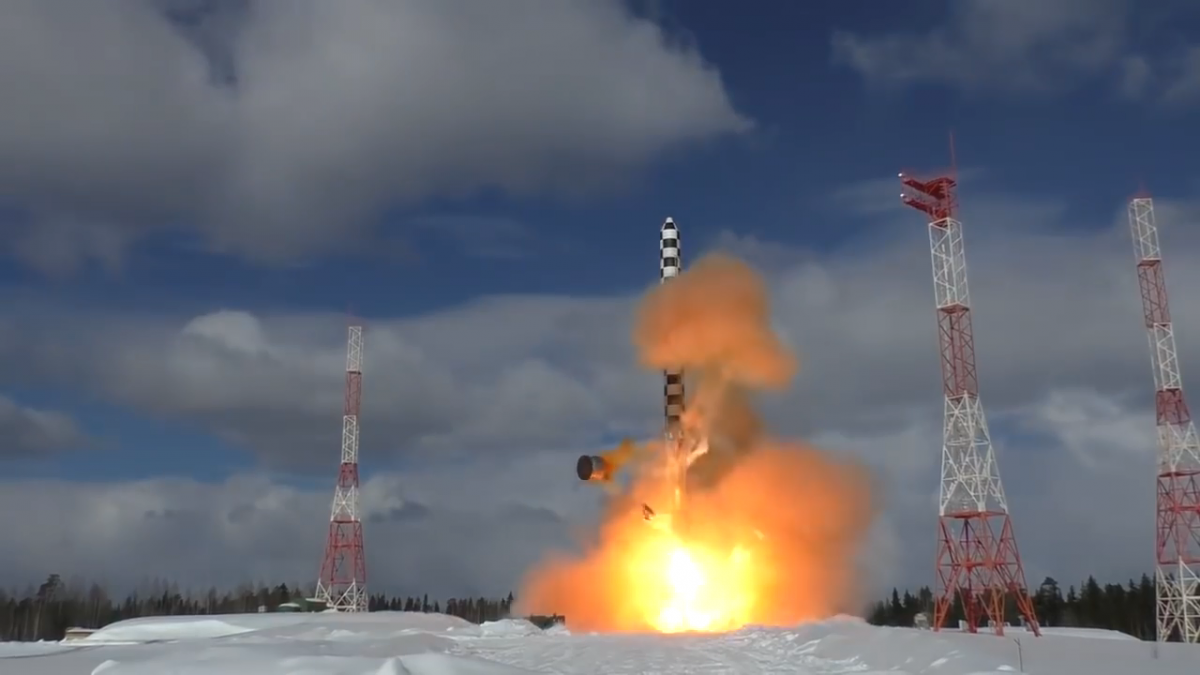Russian President Vladimir Putin said he offered to sell United States President Donald Trump hypersonic weapons during their last meeting in Japan.
Speaking at the plenary session of the fifth Eastern Economic Forum in the Primorsky Krai region, Putin said he discussed arms control measures with Trump in June during the G20 summit in Osaka and "the issue was raised as to how and in what way it would be possible to count Russian modern weapons, including the hypersonic missile systems, into the common agreements, considering that so far not a single country in the world possesses these weapons, not even the U.S.," as quoted by the state-run Tass Russian News Agency.
"I told Donald the following: 'If you want, we can sell you some and this way we will balance everything out. But truth be told, they are saying that they will soon produce it themselves," Putin remarked.
"Perhaps they will, but why waste money when we already have spent some and can get something back, and at the same time not harm our security but rather create a situation where there is a balance," he added.

Putin first unveiled his country's up-and-coming arsenal of advanced weapons during his State of the Nation address in March last year. These include the RS-28 Sarmat intercontinental ballistic missile and the accompanying Avangard hypersonic glide vehicle – said to be capable of carrying the Sarmat at speeds up to 20 times faster than the speed of sound – as well as the Kinzhal air-launched hypersonic cruise missile, the 9M730 Burevestnik nuclear-powered cruise missile, the Poseidon nuclear-powered underwater drone and the Peresvet combat laser system.
During his follow-up speech in February, Putin announced some progress in testing these weapons and confirmed reports that he was testing yet another hypersonic weapon: the 3M22 Tsirkon submarine-launched cruise missile. Like the other state-of-the-art tools in his developing arsenal, Putin has labeled these weapons invincible in the face of current or even prospective defense systems.
Though the U.S. has expressed some skepticism as to Russia's claims of progress, the Trump administration has shown concern around the narrowing gap in its military superiority against its perennial rival. Earlier this year, Trump announced a plan to include space-based interceptors as part of a global shield that would "detect and destroy any missile launched against the United States anywhere, anytime."
Such a concept, however, has been cited by Putin as his motive for moving forward with his own offensive capabilities, especially since the U.S. withdrawal from the Anti-Ballistic Missile Treaty (ABM) in 2002. Last month, Washington pulled out of another Cold War-era deal, the Intermediate-Range Nuclear Forces (INF) Treaty. Weeks later, the U.S. military tested a cruise missile that would have been banned by the pact, which restricted land-launched weapons with ranges from 310 to 3,420 miles.
Washington had accused Moscow of violating the INF by developing another weapons system, the Novator 9M729 cruise missile, but Russian officials denied this and claimed that their U.S. counterparts had broken the treaty by deploying defense systems utilizing the Mark 41 Vertical Launching System, the same platform used to fire Tomahawk cruise missiles. A Pentagon spokesperson confirmed to Newsweek that last month's mid-range cruise missile test utilized the Mark 41 and a Tomahawk variant.

U.S. officials have argued that the launchers deployed as part of NATO Western military alliance's Aegis Ashore system in Romania and Poland were not capable of offensive operations. Defense Secretary Mark Esper has expressed interest, however, in developing such capabilities, once disallowed under the INF in Europe as well as in Asia.
China, which was not a party to the bilateral INF, has also criticized an expanding U.S. military infrastructure in the Pacific region.
Putin has so far declared a self-imposed moratorium on deploying INF-busting weapons as long as the U.S. did not field such weapons either. At Thursday's event, he reaffirmed this, but noted that Russia would begin developing such weapons in response to the U.S. test.
"We said outright that we would not deploy anything after the Americans tested such a missile. We will make such missiles, of course, but we will not deploy them in the regions where no ground-based missile systems of this class of U.S. manufacture have emerged," the Russian leader said, expressing "regret" and "certain alarm" over the prospect of new U.S. ground-based systems in South Korea and Japan, as quoted by Tass.
Uncommon Knowledge
Newsweek is committed to challenging conventional wisdom and finding connections in the search for common ground.
Newsweek is committed to challenging conventional wisdom and finding connections in the search for common ground.
About the writer
Based in his hometown of Staten Island, New York City, Tom O'Connor is an award-winning Senior Writer of Foreign Policy ... Read more
To read how Newsweek uses AI as a newsroom tool, Click here.





